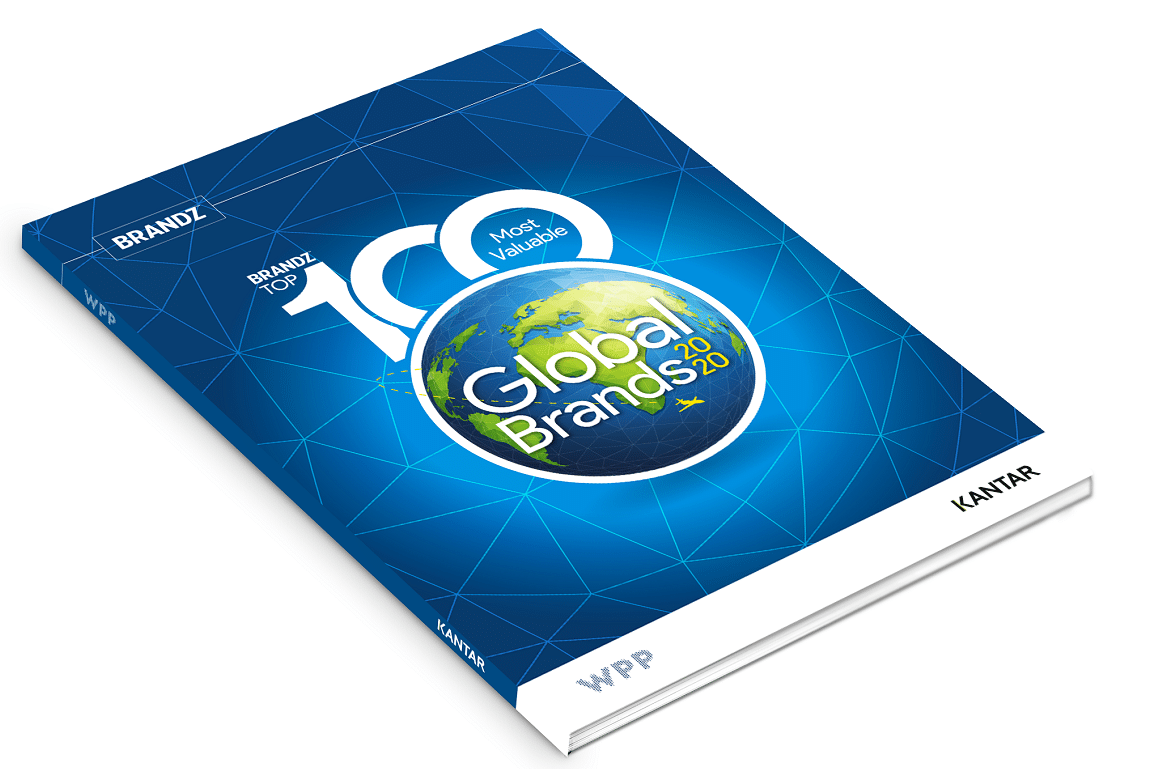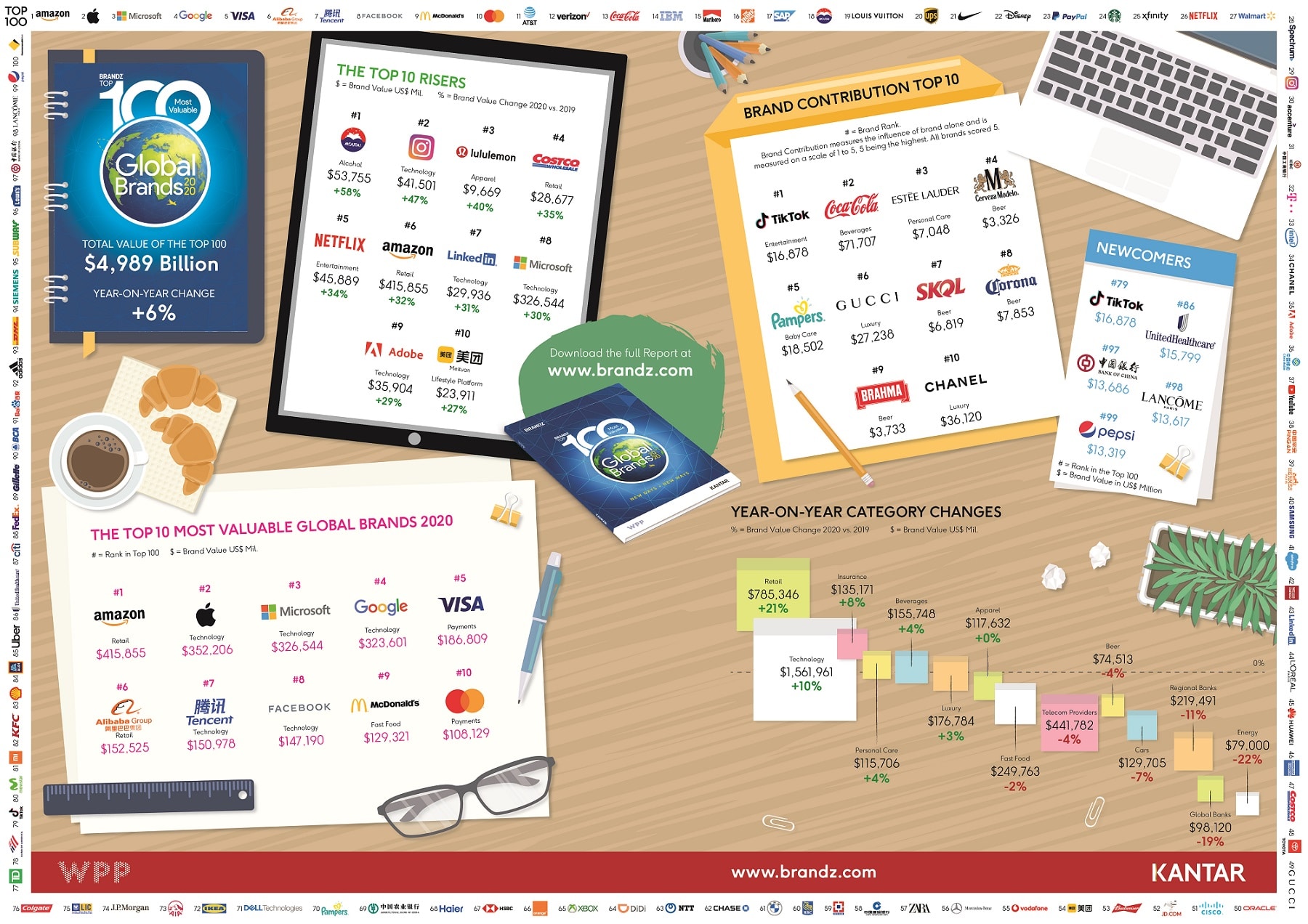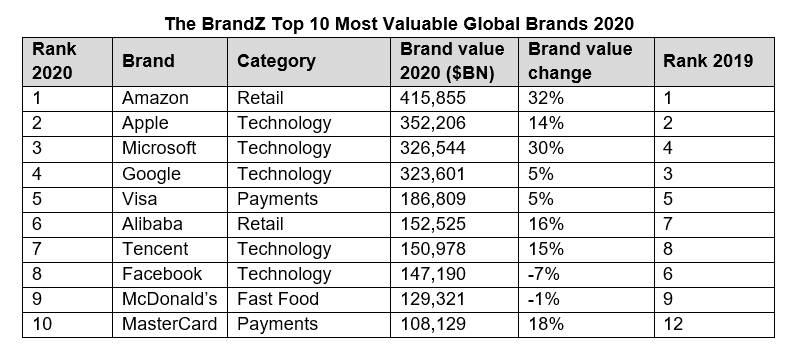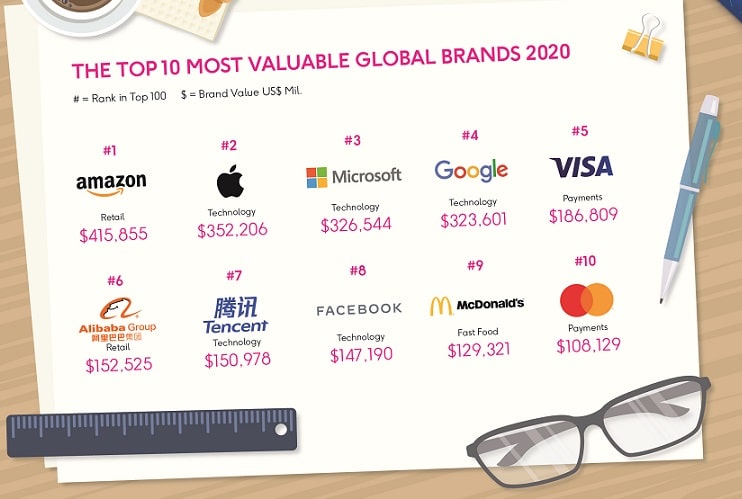
The 2020 BrandZ Top 100 Most Valuable Global Brands Report released today by WPP and Kantar, found that Amazon’s value grew32% to $415.9bn, an increase of $100bn, representing a third of the Top 100’s total growth.
Global brands have an opportunity to provide confidence and reassurance as consumers actively seek out trusted brands during times of uncertainty and crises, the report found.
The top 100 total brand value by 5.9% to almost $5 trillion – equivalent to the annual GDP of Japan – despite the economic, social and personal impacts of COVID-19.
In a new BrandZ analysis of more than 5,000 brands, research showed almost 9% of a brand’s equity is driven by corporate reputation, of which responsibility is a key attribute. Over the last 10 years, the importance of responsibility to consumers in relation to making brand choices has tripled.
Brands perceived by consumers to be among the world’s most trusted and responsible shared three crucial factors that proved particularly important for building consumer trust and confidence, even when a brand might be new to a market. These are honesty and openness; respect and inclusion; and identifying with and caring for customers. Brands that develop these associations more strongly tend to outperform their competitors in defending and growing their brand value.

Growing power and influence of technology
Telecoms, banking and energy are among the hardest hit categories affected by the ongoing pandemic and previous economic instability over the last 12 months. Although positioned in these slightly lower growth categories, UK brands Vodafone (no.55, $23.1bn), HSBC (no.67, $18.8bn) and Shell (no.83, $16.1bn) remain in this year’s BrandZ Top 100 ranking, which has increased in overall brand value by 5.9% to almost US$5 trillion – equivalent to the annual GDP of Japan. Prior to the global pandemic, the total brand value of the Top 100 brands was set to increase by 9%.
Amazon continued to invest heavily in digitisation and online to offline (O2O) and drove retail category growth. This helped it maintain the top position for the second year running as the world’s most valuable brand, growing 32% to US$415.9bn. Amazon’s value grew by almost $100bn this year and accounts for a third of the Top 100’s total growth.
Short video-sharing social network TikTok (no. 79, $16.9bn) was the highest new entry this year, offering light-hearted, user-generated content; something consumers have found particularly fun and engaging whilst in lockdown during the COVID-19 pandemic.
Jane Bloomfield, Chief Growth Officer, Kantar UK said: “Against a backdrop of uncertainty, those companies that have consistently made smart investments in longer-term marketing and in building strong brands have managed to stave off the worst of the crisis to date. Our BrandZ data allows business leaders to understand how much ‘brand’ drives their business revenues and growth. It also provides valuable information on what brands must do to help them remain relevant and adapt to changing consumer needs. COVID-19 has indiscriminately impacted everyone, including UK brands. However, consistent investment in marketing can and will help carry you through a crisis.”

As consumers spend more time online during the pandemic looking for entertainment and fun, media and entertainment – a new category for 2020 – has performed exceptionally well and accounts for over half of the brands in the Top 20 Risers ranking. These include Netflix (+34%, $45.9bn) up eight places to no. 26, Instagram (+47%, $41.5bn) up 15 places to no. 29, LinkedIn (+31%, $29.9bn) up 15 places to no. 43 and Xbox (+18%, $19.6bn) up 22 places to no. 65.
Technology brands continued to dominate the ranking, representing over a third (37%) of brand value in the Top 100. Apple maintained its position as the second most valuable global brand (+14%, $352.2bn) while Microsoft regained the no. 3 position (+30%, $326.5bn) ahead of Google (+5%, $323.6bn) at no. 4, due to the growth in its cloud-enabled workplace ecosystem that incorporates Office365 and Microsoft Teams, allowing people to maintain ‘business as usual’ during the lockdown.
However, over the past year, other categories have performed less well, including energy which dropped 22% in value, global banks fell 19%, regional banks fell 11% and cars fell by 7%.
Mark Chamberlain, Managing Director of Brand, Kantar UK, commented: “As we adapt to the ‘next normal’ as the pandemic and life evolves, UK brands, both large and small, have to pay attention to the key consumer themes emerging from lockdown that will play a role in future behaviour and consumption. We see these across five key areas that all brands should look to understand and monitor. They are increased self-reliance and resourcefulness in ‘using what you’ve got’ to create entertainment, cook food and offer little luxuries; saving over-spending to protect against harder times; honesty, transparency and directness are more valued than ever; we see increased appreciation of local communities and economies as Britain becoming more inward looking in seeking products and connections closer to home; and finally consumers are seeking leadership and businesses that put people before profits. If you can meaningfully amplify these things in a way that is consistent and true to the brand, that brand will be primed to win more than its fair share.”

Other key trends highlighted in this year’s BrandZ Global Top 100 study include:
- MasterCard entered the Top 10 for the first time this year, due to strong financial performance, supported by growing brand equity especially in engaging consumers: successfully fitting into the ‘ecosystem’ of their everyday lives and gaining a close emotional connection through its purposeful positioning.
- Five new entrants appear in the Top 100, led by Chinese entertainment brand TikTok, followed by UnitedHealthcare (no. 86, $15.8bn), Bank of China (no. 97, $13.7bn), Lancôme (no. 98, $$13.6bn) and Pepsi (no. 99, $$13.3bn).
- US brands represented more than half of the Top 100 brands. Asian brands represented a quarter of the Top 100 brands, with 17 from China (including Alibaba and Tencent in the Top 10) and two from Japan (Toyota and NTT).
- Sustainability is the new luxury – younger consumers expect the qualities associated with luxury, but with sustainable materials and less packaging. Four luxury brands made the Top 100 this year, led by Louis Vuitton (+10%, no. 19, $51.8bn).
The BrandZ Top 100 Most Valuable Global Brands report and rankings are available to download here and at Brandz.com.
Methodology
Now in its 15th year and commissioned by WPP, the valuation behind the BrandZ™ Top 100 Most Valuable Global Brands was conducted by brand equity research experts Kantar.
The ranking combines rigorously analysed market data from Bloomberg with extensive consumer insights from over 3.8 million consumers around the world, covering over 17,500+ different brands in 51 markets.
The ability of any brand to power business growth relies on how it is perceived by customers. Grounded in consumer opinion, BrandZTM analysis enables businesses to identify their brand’s strength in the market and provides clear strategic guidance on how to boost value for the long-term. The eligibility criteria are:
• The brand is owned by a publicly traded enterprise, or its financials are published in the public domain
• Unicorn brands have their most recent valuation publicly available. (In prior years, only publicly-traded or audited companies were eligible)
Source:
